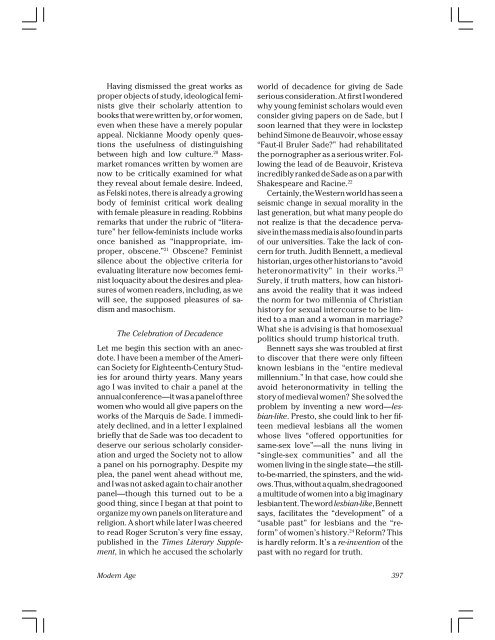Feminist Literary Criticism: From Anti-Patriarchy to Decadence
Feminist Literary Criticism: From Anti-Patriarchy to Decadence
Feminist Literary Criticism: From Anti-Patriarchy to Decadence
You also want an ePaper? Increase the reach of your titles
YUMPU automatically turns print PDFs into web optimized ePapers that Google loves.
Having dismissed the great works as<br />
proper objects of study, ideological feminists<br />
give their scholarly attention <strong>to</strong><br />
books that were written by, or for women,<br />
even when these have a merely popular<br />
appeal. Nickianne Moody openly questions<br />
the usefulness of distinguishing<br />
between high and low culture. 20 Massmarket<br />
romances written by women are<br />
now <strong>to</strong> be critically examined for what<br />
they reveal about female desire. Indeed,<br />
as Felski notes, there is already a growing<br />
body of feminist critical work dealing<br />
with female pleasure in reading. Robbins<br />
remarks that under the rubric of “literature”<br />
her fellow-feminists include works<br />
once banished as “inappropriate, improper,<br />
obscene.” 21 Obscene? <strong>Feminist</strong><br />
silence about the objective criteria for<br />
evaluating literature now becomes feminist<br />
loquacity about the desires and pleasures<br />
of women readers, including, as we<br />
will see, the supposed pleasures of sadism<br />
and masochism.<br />
The Celebration of <strong>Decadence</strong><br />
Let me begin this section with an anecdote.<br />
I have been a member of the American<br />
Society for Eighteenth-Century Studies<br />
for around thirty years. Many years<br />
ago I was invited <strong>to</strong> chair a panel at the<br />
annual conference—it was a panel of three<br />
women who would all give papers on the<br />
works of the Marquis de Sade. I immediately<br />
declined, and in a letter I explained<br />
briefly that de Sade was <strong>to</strong>o decadent <strong>to</strong><br />
deserve our serious scholarly consideration<br />
and urged the Society not <strong>to</strong> allow<br />
a panel on his pornography. Despite my<br />
plea, the panel went ahead without me,<br />
and I was not asked again <strong>to</strong> chair another<br />
panel—though this turned out <strong>to</strong> be a<br />
good thing, since I began at that point <strong>to</strong><br />
organize my own panels on literature and<br />
religion. A short while later I was cheered<br />
<strong>to</strong> read Roger Scru<strong>to</strong>n’s very fine essay,<br />
published in the Times <strong>Literary</strong> Supplement,<br />
in which he accused the scholarly<br />
world of decadence for giving de Sade<br />
serious consideration. At first I wondered<br />
why young feminist scholars would even<br />
consider giving papers on de Sade, but I<br />
soon learned that they were in lockstep<br />
behind Simone de Beauvoir, whose essay<br />
“Faut-il Bruler Sade?” had rehabilitated<br />
the pornographer as a serious writer. Following<br />
the lead of de Beauvoir, Kristeva<br />
incredibly ranked de Sade as on a par with<br />
Shakespeare and Racine. 22<br />
Certainly, the Western world has seen a<br />
seismic change in sexual morality in the<br />
last generation, but what many people do<br />
not realize is that the decadence pervasive<br />
in the mass media is also found in parts<br />
of our universities. Take the lack of concern<br />
for truth. Judith Bennett, a medieval<br />
his<strong>to</strong>rian, urges other his<strong>to</strong>rians <strong>to</strong> “avoid<br />
heteronormativity” in their works. 23<br />
Surely, if truth matters, how can his<strong>to</strong>rians<br />
avoid the reality that it was indeed<br />
the norm for two millennia of Christian<br />
his<strong>to</strong>ry for sexual intercourse <strong>to</strong> be limited<br />
<strong>to</strong> a man and a woman in marriage?<br />
What she is advising is that homosexual<br />
politics should trump his<strong>to</strong>rical truth.<br />
Bennett says she was troubled at first<br />
<strong>to</strong> discover that there were only fifteen<br />
known lesbians in the “entire medieval<br />
millennium.” In that case, how could she<br />
avoid heteronormativity in telling the<br />
s<strong>to</strong>ry of medieval women? She solved the<br />
problem by inventing a new word—lesbian-like.<br />
Pres<strong>to</strong>, she could link <strong>to</strong> her fifteen<br />
medieval lesbians all the women<br />
whose lives “offered opportunities for<br />
same-sex love”—all the nuns living in<br />
“single-sex communities” and all the<br />
women living in the single state—the still<strong>to</strong>-be-married,<br />
the spinsters, and the widows.<br />
Thus, without a qualm, she dragooned<br />
a multitude of women in<strong>to</strong> a big imaginary<br />
lesbian tent. The word lesbian-like, Bennett<br />
says, facilitates the “development” of a<br />
“usable past” for lesbians and the “reform”<br />
of women’s his<strong>to</strong>ry. 24 Reform? This<br />
is hardly reform. It’s a re-invention of the<br />
past with no regard for truth.<br />
Modern Age 397
















